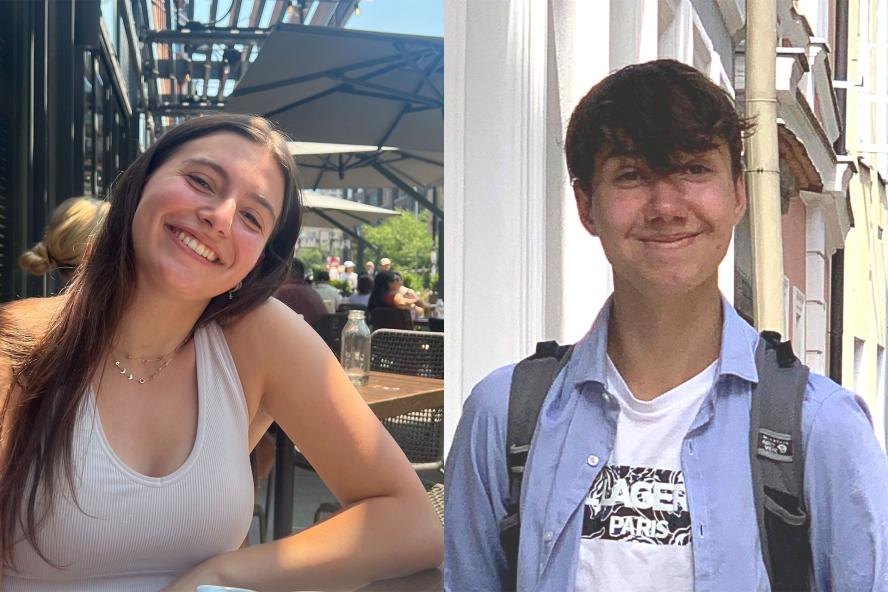Instructor Spotlight: Sam Coleman and Alex Crete

Tell us about yourself and what inspired you to teach this course
Sam Coleman: I’ve been an avid reader for as long as I can remember, and have always been drawn to the fantasy genre as a form of escapism into worlds that I found to be more vivid than movies. Then freshman year I was placed in an ExCollege pre-major advising course alongside Alex called YA Dystopia and the Rebellious Spirit, which placed the novels I already loved under a newfound academic lens. Not only was it an incredibly fun discussion seminar, but it also inspired both Alex and me to utilize our passion for fantasy novels to teach our own course as upperclassmen in an attempt to further legitimize the genre in academic settings.
Alex Crete: I’ve always been passionate about literature and reading, namely across fictional genres like fantasy. My final project in the Explorations course Sam and I took together was to design a syllabus for a potential course (albeit a different premise from Villainy 101), upon which Sam and I later drew for inspiration in the planning of our class in its current version. As for villains, we figured it would be interesting to center our focus on a character type that is just as important as the hero, often underestimated / misunderstood / erroneously written to be a one-dimensional plot device. People don’t give villains enough credit!
What does it mean to be a villain?
SC: We hope to explore and adapt the definition of a villain over the course of the semester, but generally a villain is a character who exists to oppose the protagonists. While the methods and motivations may differ, villains are devices to drive a plot forward, and often the dimensionality of the story can hinge on the construction of a believable and complex villain. To be a good villain is to exist in a realm of moral ambiguity. A villain is a character that forces us to question our own values, which is why it’s so complicated to define.
AC: The villain’s motives (and their capacity for moral 'flexibility’) may vary, but we will posit in the course that the one dimensional, ‘pure-evil’ villains are increasingly less enjoyed, and rather that modern audiences prefer to see some of themself in a villain.
Who is your favorite villain? Why?
SC: This is an incredibly difficult question, so I would say one of my favorite villains is Loki, who arguably leans antagonistic rather than villainous. In his Marvel Cinematic Universe (MCU) characterization I could never fully hate him, even when I rooted against what he aimed to enact. In addition, I find him a fascinating component of Norse mythology as the god of trickery. He is not only a gender-fluid shapeshifter, but a seemingly well-intentioned harbinger of doom who demonstrates a tragic combination of intention and consequences.
AC: While I have a lot of favorite villains, my initial thought is Dostoevsky’s Grand Inquisitor. In this parable (a segment from The Brothers Karamazov), the inquisitor figure states that humanity doesn’t truly yearn for free will; rather, he argues that freedom and choice are burdens, and that it is in mankind’s nature to prefer subservience and security, with an illusion of freedom. Many villains since have been modeled after the Grand Inquisitor, including the MCU's Thanos. I’m also a huge fan of Lovecraftian antagonists – arguably not ‘villains’ in the conventional sense, but these sort of sublime, unfathomable entities who embody existential fear, madness, and the unknown.
What is something coming up in your course that you are excited about?
SC: Alex and I plan to host a mock trial where our students get to embody villainous characters on the stand as well as prosecutors and defenders. With Alex and me as judges, the aim is to bolster our collective understanding of the power of persuasion alongside flexible morality should rational reasoning be presented. We are excited for them to engage with the material in a creative way and fully embrace a path of reasoning they don’t ordinarily engage with.
AC: We’re excited not only to see how our students take on the problem, but also to see them engage with one another in a simulated debate context.
What do you hope that students will take away from your course?
AC: As peer leaders and advisors, Sam and I have two main hopes for our class – one, of course, is to explore the topic of villainy through fantasy. Through such, we want to inform our students on the topic, and hopefully to inspire in them a greater love and appreciation for the villains they discover in future literature and media. Meanwhile, the course will allow Sam and I to continue studying villains and their moral implications, too, in greater depth. The advising component to our course is our second prime motivation – we plan to give our students an introduction to college life and coursework, and to support them throughout in any ways that we can.
SC: We want to create a supportive environment for the first-years in their transition to college life and the complex balancing act between freedom and academic responsibility. We are a resource that they’ll hopefully use to jumpstart a successful college career.
Sam Coleman (she/her) is a junior majoring in Ancient World Studies and Civic studies, minoring in Chinese. She is from Chicago. She is a member of Tufts Public Harmony and the Tufts Low-keys a cappella group.
Alex Crete (he/him) is a junior from Paris, majoring in International Literary and Visual Studies (ILVS), Ancient World Studies, English and Philosophy. He is passionate about fiction literature and aspires to write after his studies.